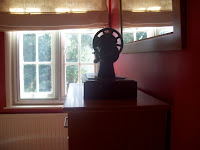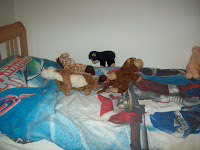We've got a little catching up to do.
At the end of the holiday in the states, Sarah and I packed up the house in Northampton and left it in good condition for the renter, Ariel. I was an ambivalent participant in the clean up. Even though we're framing this chapter of our lives as a temporary permanent move - we're coming back to the states some day - it was hard to leave Northampton yet again, especially after spending time with friends at book group, poker, golf, and dinners and with family at the beach and in Boston. I don't take these relationships for granted and I've been feeling the distance lately because of the time difference and the difficulty in maintaining contact.
One antidote for my homesickness has been to explore my new surroundings. Since we've been back from the States, I have been immersed in my English "adventure" with Sarah as both tour guide and companion. I will try not to bore you with too many pictures and tales from, what may seem to some as, my endless English vacation.
Grantchester
Sarah’s mother, June was visiting for a few days so we ventured up to Grantchester for tea. The Orchard at Grantchester is situated in a village near Cambridge where Bertrand Russell, Wittgenstein, Sylvia Plath, E.M. Forster, Virginia Woolf (together known as The Granchester Group) and others spent time away from their studies. It can still be reached from Cambridge by punts along the River Cam. Grantchester holds some renown. One inhabitant, Rupert Brooke, who, by all accounts, was a middling poet but most remarkably, a handsome and thus “opportunistic” fellow. (Tiger Woods without quite as much media coverage?) Around the corner from the Orchard at Grantchester stands a church, which we visited, dating back to 1100 A.D., where Brooke must have confessed his sins. (Learn more about Grantchester at: http://www.orchard-grantchester.com/)
Audley End House
On the way back, we stopped at Audley End, a stately home, just 30 minutes from our house which is part of the English Heritage, a trust created to maintain these sites. Audley End was a residence of members of the king’s court and eventually to Charles II (sadly, no relation) in 1668. Audley End, like many of these manors, tells a fascinating and sometimes sordid history of portions of the rich and aristocratic. Two massive wings had been demolished but the parterre gardens, stables, organic fruit and vegetable gardens still exist. (I get some kickbacks for advertising: http://www.english-heritage.org.uk/daysout/properties/audley-end-house-and-gardens/)
Norfolk Coast
The following week, James was with his dad. Sarah and I snuck away to the Norfolk coast for two days. We stayed at the top of a seaside inn (a very lucky find) with a view of a coastline that changes dramatically with the tides. We walked for 7 miles along a coastal path which took us past salt marshes, the site of Roman ruins, small fishing villages, and out to a beach. A beautiful area.
On the second day, it was "just tipping it down” as Sarah would say so we visited Holkham Hall, which is an active residence of the seventh Earl of Leicester and his family. They were not available to receive us so we toured the facility on our own. To give a proper sense of scale – actually, to move it beyond comprehension – there are 400 houses on the property. (The tractor with a bushhog attachment was a mere speck on the back lawn.) In the early 1970’s, the manor was near dissolution but the Earl was able to turn the properties and accompanying farms and small industries into profitable ventures, saving Holkham Hall from an unknown fate. Like Audley End, a docent stands in each room, unassuming yet eager to regale you with facts and lore about the manor and its inhabitants. The last stop as we left the coast was an ale house with 50 locally brewed offerings. I don't drink vast quantities of beer but I've been sampling and savoring my purchases. (I can't help myself : http://www.therealaleshop.co.uk/)
For local colour, I've also now attended the Brent Pelham village fete (they pronounce it "fate" shunning the French version probably due to lingering antipathy for the French), our village picnic and I will soon partake in the Harvest Festival.
"Two countries separated by a common language" - George Bernard Shaw
Over time, in my adjustment to things British (and to stave off Anglicization), I have started to categorize my experience into analogs and non-analogs. Boot for car trunk, aubergine for eggplant, courgette for zucchini, kagool for raincoat, and so forth and so on. For the most part, there is a one-for-one correspondence between the languages. Some of the phrases are enchanting and entertaining. A situation that goes bad, goes "pear-shaped." (I love that one.) Though Shakespeare is long gone, they still use the terms "fortnight" (I heard it twice in two days) and "methinks." "Losing the plot" is not to be confused with getting your "knickers in a twist" though the latter may lead to the former.
Grammatically, there are differences reflected in conjugation: Referring to the English football team, the announcer may comment, "England are moving the ball well" or in general conversation you might hear, "The group are coming for tea."
Gustatorily, the differences take a darker turn. Whilst (catch that?) in Brancaster Staithe (on the Norfolk Coast), we had a true English breakfast including black pudding. Scottish in origin. Sounds benign, right? Congealed pig's blood on the menu wouldn't sell well. Fine. But to present it as a delicacy? By jove! Sure they season it and I understand being resourceful with offal (heck, my eastern European ancestors savored stuffed derma and I've yet to learn what's in that) but give a bloke a heads up when it gets that serious. As for other dining experiences, sausage seems to be a staple of the English diet. At the recent village picnic, one participant took a bite of a sausage and, savoring it like a fine wine, cited it's origin as Braughing, a nearby village. I could go on.
Meteorology
The Norfolk coast also revealed other aspects of the British personality. A trip to the beach can happen in any weather, you just need to be well equipped. Sarah tells stories from her youth (I know, she is still young) where they would set up a windbreak (see picture) and, if it was raining, erect a dinghy over their heads for shelter. I've yet to witness the latter and, sensibly, may never.
(Click on the pictures to enlarge them.)
 |
| Keeping warm with a windbreak on the Norfolk coast |
 |
| Does that look like a beach day to you? |
Speaking of weather (let me digress), it seems every Brit is an amateur meteorologist swinging dramatically between optimism and pessimism. A dark cloud on the horizon is a sure sign of rain. In a near-totally darkened sky, enough blue sky to "make a sailor's trouser leg," offers hope for a clear day. Remembering descriptions from my childhood, English weather was simplistically characterized as rainy. And my experience in America is that the forecasts are actually generally accurate with an occasional error. In England, since it is a little island, it is nearly impossible to provide an accurate forecast. There are so many small weather pockets moving through. On a typical day it will rain a couple of times. So I think the effort at meteorology is an attempt to maintain some semblance of control over, really, a helpless situation.
Hanging laundry on the line to dry (let me digress again to an even more engaging topic) is an English pastime. While the ethic is admirably "green," it is impractical given the predicatably unpredictable weather. How many mornings now, at the bus stop, have I heard about someone either running to take the wash in in anticipation of the rain or commenting on the futility of yesterday's wash-hanging?
(Following this discourse - not to be confused with a diatribe - you and I can now understand why James said to me in the car a couple of weeks ago, "Chip, you need to get a job." More on that later.)
I digress. Back to non-analogs (besides sailor's trouser legs and black pudding). After our tours of English manors, the vestiges of the aristocracy still hold a unique position. Sure America has its uber-wealthy upper crust, but when your monarch is still supported by taxing the citizenry, and the legacy throughout the country is of noblemen and women, class is more formalized compared to the "bootstrap" mentality found in America.
Speaking of British history (now is this a digression within a digression - have you seen Inception?), Sept. 7, was the 70th anniversary of the beginning of the Blitz of London. The accounts of death and devastation are harrowing. 72 straight days of bombing. Enemy planes came right up the Thames, taking out stashes of supplies. Sarah has pointed out to me parts of East London where new construction adjoins Victorian era buildings telling the tale of the bombing. WWII holds a much firmer and intimate place in the British psyche than I had realized. (9/11 may now similarly occupy the American psyche.) Even before the anniversary of the Blitz, I had heard several other radio accounts of the war and have come to better understand its place in British consciousness. The proximity naturally leads to the primacy of the events.
Domestic Update
Speaking of war, on the home front, we are.......all adapting well. (See, just kidding.) James did say, after three days of school, that he was sick of it. He's getting more challenging homework - so far I approve - but he also mentioned, wistfully, his loss of freedom.
It is always fascinating to watch a child's cognitive development. Some of this entails attempts by James at wordplay in the form of jokes, puns, and the new, and sometimes, creative use of expressions. Then there are the poop jokes. Yet, again, he asks the most interesting questions about life revealing a true inquisitiveness and, almost, philosophical attitude.
Sarah has less time for philosophy. She is currently challenged by the potential changes to the NHS (National Healthcare System) introduced by the new Tory (well, coalition) government. I could send you the white paper - the government's platform - but I'll spare you. Among other things, they are proposing changes to the management of commissioning (payment) of services from a centralized body to individual practices. It has far-reaching implications for her practice, and everyone else's, so she's attending strategy meetings and discussions. Hopefully, I have been taking some of the pressure off her by taking James to the bus in the morning, making lunches and dinners, and doing other household chores.
I have a card game coming up with some of the blokes in the village. It will take time to learn the CVs for these guys like I have on my Northampton boys. I'll try to take some money off them in the meantime.
Employment Update
No news yet. I am making forays, joining discussion groups, visiting schools and still pursuing the transfer of my credentials. (The agency recently returned someone else's check to me which raises doubts about their efficiency.)
Note: This blog website is a little crotchety when it comes to formatting. Please excuse the gaps. It's not my fault, okay?






























